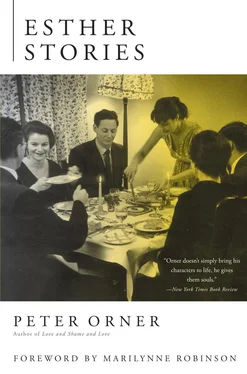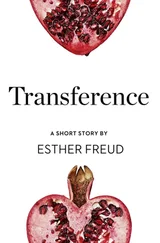“Walt,” she says. “Hold still. Hunk of sleep in your eyes the size of China. Telling me I don’t know. Hold still.” Sarah fingers the yellow schmutz out of the edge of his eye with a nail. Then she pulls her finger down his cheek and lets go.
Melba Kuperschmid Returns
MELBA KUPERSCHMID was a beautiful one, and everybody knows what happens to the beautiful ones. Scooped up and gone before she turned twenty. He was a traveler; nobody even knew his name or what he did for a living, only that he had daring and never lived in one place for very long. But her old friend Sarah Kaplan used to get postcards from places that didn’t seem very romantic from the photographs. Windsor, Canada, for one. Hamilton, Ohio, for another. Then, twenty-three years after she left, as everybody claimed they knew in their heart of hearts would happen sooner or later, Melba Kuperschmid came home. Discarded like the beautiful ones always are, one way or another. But when she came back to Fall River, she wasn’t fat like everybody expected. She was still gorgeous. Still had all that hair and those enormous black eyes men fell into, flailing. Still Melba, not destroyed, even a little giggly, like she always was. Not lamenting being deserted, not even discussing it.
For a few months she went to cocktail parties and talked (politely) to the husbands, letting everybody know from the way she refused to laugh at the men’s bad jokes that she wanted no part of them. This of course made the wives suspicious. What else could a returned (spurned, vanquished) divorcee possibly want if not their potbellied husbands? The other curious thing was that not long after she came home (she had no family left, and she’d had no children) Melba — now in her mid-forties — opened a seamstress shop on Corky Row, apparently with her alimony money. She’d always been good at sewing, a lot of the girls remembered that. But Melba Kuperschmid? A dressmaker?
Sarah had always loved her. As girls they often left school in late morning and spent afternoons trudging the mud along Watuppa Pond. Slogging and cackling about people. They used to talk about what they’d do when they got to Paris. Twirl in the streets, first of all. Then search for dark, Mediterranean men with unpronounceable names and wispy, tuggable mustaches. For Sarah, Melba’s return was a strange jolt. She’d been marching forward. She’d raised Rhoda into a girl people talked about (Rhoda had been elected “most garrulous” and “best dancer” by her class at Durfee). Sarah had served as volunteer chair of the hospital charity luncheon eleven years in a row, and was a respected member (and past treasurer) of the Hebrew Ladies Helping Hand Society. The new house on Delcar wasn’t so new anymore, but the mortgage was far from dead and buried. There was Walt and his cars. He talked about his old junked cars as if they were children who’d grown up and gone away. Now he was in love with Volvos, which made him, according to him, avant-garde. Rhoda already in her fifth term at Smith the year Melba came home, 1961.
Was it really possible that Melba wanted nothing more than to open a shop and live quietly, modestly, in a rented apartment mid-hill? Sarah tried to distance herself from the gossip of the girls. There were all kinds of explanations. Dotty Packer said that some cousin of Leddy Levine (of the Harry Levines) told her that Melba’s ex-husband was a gambler who fled because he was wanted by J. Edgar Hoover and the Sugar House Gang for extortion and unpaid debts. Somebody else — Ruth Gerard — said Melba’s husband was a kind of junior-issue sheik who got summoned back to Arabia to marry a sultan’s first-born daughter. That was a good one. Ruth Gerard always came up with good ones, and Sarah chose not to add that she had in her possession an old photograph (Melba had sent it from the Midwest somewhere) of the man she married and he was white as white could be, bare-chested, leaning against a tree, wearing a bowler and a crimped smile that made him look like he was being pinched, but oh, was he handsome, very. The only thing Sarah would offer the gossip eaters was a lie she claimed she’d heard from Tenelle Donnatello (who was considered close to the new Melba because it was from her husband, Felix, that Melba rented shop space) that Melba had left him, not the other way around. This of course prompted Bea Halprin to huff, “Well, in that case, where’s her other man? And why come back here if life was so wonderful she could ditch him in the first place?”
The fact was that nobody knew because nobody asked. Even the most fearless nosey parker, Ellie Dondis, didn’t have the courage to broach the subject directly. Because there still floated about Melba a halo of untouchableness, an aura that went beyond her physical beauty into realms no one could describe in conversation. She’d had it since she was a child, and everybody recognized that it still shrouded her with as much force as ever. (For example, they all started wearing hats indoors again.) Yet since Melba was something of a shopkeeper now, it became a question of class. This didn’t bother Sarah, of all people, but it did, after a while, make it more awkward to invite her to cocktail parties, and eventually the girls stopped asking her to most gatherings, except the occasional low-profile non-charity luncheon. And when this didn’t appear to ruffle Melba’s feathers, some of the girls started saying, Maybe there’s something wrong upstairs. Didn’t something like this happen to Sylvia Zagwill’s brother Jerome, that one morning he just refused to get out of bed ever again? There was a lot of dispute on this point, because even those girls who stopped sending over invitations still took their dresses down to Melba to be fitted or let out. First, out of pity, they took things they no longer wore. Later they relied on her because she was so good they couldn’t live without her. Finally the consensus was that anybody that excellent with the needle (particularly after all these years) couldn’t possibly be crazy. But that didn’t make the socializing problem any easier for anybody.
About eight months into Melba’s return, Sarah parked the big Lincoln Town Car on the street in front of the house on Delcar. (Walt always insisted she drive his past loves; this elephant was so huge it didn’t fit in the garage.) But she didn’t get out of the car. Instead, she paused and reflected that she’d just spent a good chunk of her time at the market worrying over the mystery of Melba Kuperschmid: her lack of bitterness, her lack of interest in reclaiming any former glory. They had all been so jealous — she was the envy of a thousand girls — it must have been real. Now her coming home and not caring a lick threw everything into question. The way she used to walk the halls, as if stepping on puddles of air nobody else could see, the boys quivering and gnawing their collars. Sarah left the groceries in the car and went in the house to look for something that needed mending. Not finding anything, she went into Walt’s closet forest of white shirts and ripped the sleeve of one. Got back in the car, melting strawberry ice cream and all (this was in August), and headed down the hill to Corky Row. She found Melba behind the counter, alone, her back to the door, working the Singer, the clicking monotonous, feverish, loud enough for her not to hear Sarah open the chimeless door.
And Sarah stands mesmerized by the back of Melba’s head. Her hair is pulled back tight in a plait; its end rests on her shoulder. Sarah looks at the exquisite column that forms that familiar neck. If she could freeze a moment in time, she’d freeze this one, the one before Melba turns around and sees her, because it isn’t the new Melba she wants, it’s the old one, the one who left here looking for something better. To ask what it’s like to be so loved that rolling your tongue around your teeth’s enough to make men swoon and need cold water. And that still not enough for you. Melba, with your simple black hair and big eyes, still no breasts to boast to the Queen of Sheba about, and yet you’re Melba, aren’t you? Aren’t you? You were two years ahead of me. And you used to whisper that you stole a pack of Mr. Jalbert’s cigarettes. Come on, Sare. We’re as good as gone! And that was all it ever took.
Читать дальше












